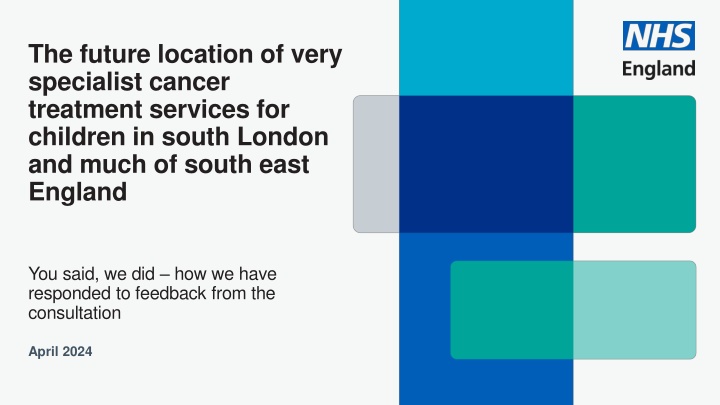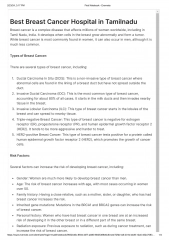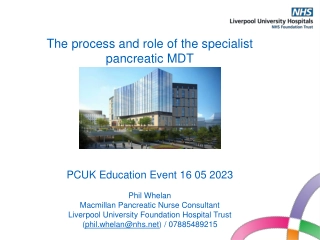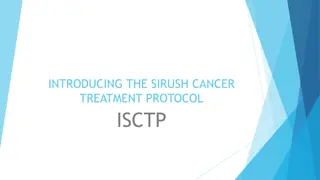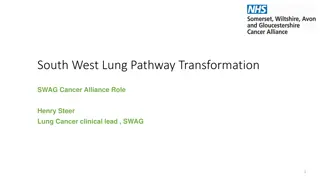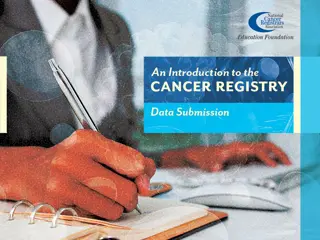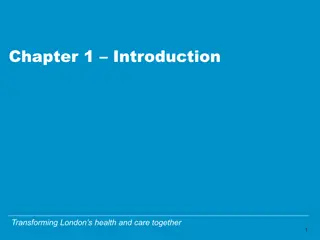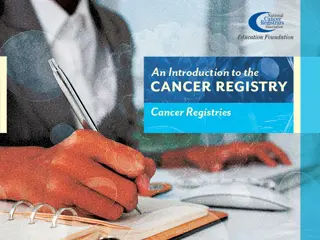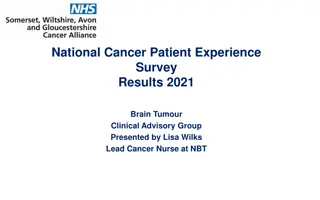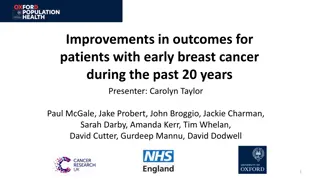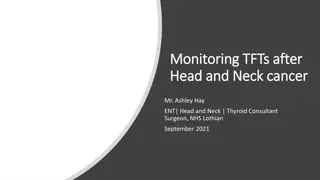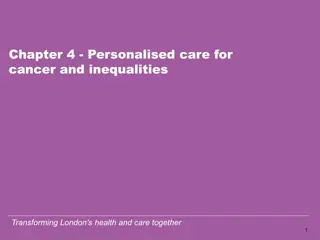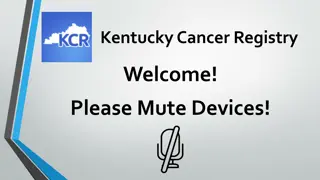Future Location of Specialist Cancer Treatment Services for Children in South London and Southeast England
This document outlines the feedback received during the consultation regarding the relocation of specialist cancer treatment services for children in South London and Southeast England. The decision was made to move services to Evelina London Children's Hospital, with radiotherapy at University College Hospital, based on extensive feedback analysis. Various stakeholder groups were engaged, ensuring a diverse range of perspectives were considered. The consultation responses highlighted key issues and considerations for the transition to the new location. Collaboration with stakeholders and partners will continue to ensure a smooth transition process.
Download Presentation

Please find below an Image/Link to download the presentation.
The content on the website is provided AS IS for your information and personal use only. It may not be sold, licensed, or shared on other websites without obtaining consent from the author.If you encounter any issues during the download, it is possible that the publisher has removed the file from their server.
You are allowed to download the files provided on this website for personal or commercial use, subject to the condition that they are used lawfully. All files are the property of their respective owners.
The content on the website is provided AS IS for your information and personal use only. It may not be sold, licensed, or shared on other websites without obtaining consent from the author.
E N D
Presentation Transcript
The future location of very specialist cancer treatment services for children in south London and much of south east England You said, we did how we have responded to feedback from the consultation April 2024
Introduction This document provides a high-level summary of how we have used feedback received during our consultation about the future location of very specialist cancer treatment services for children who live in south London and much of south east England. We are very grateful to everyone who responded, and this feedback has been invaluable in informing our work and will continue to be so as we implement the change of location that has been agreed: services for the Children s Cancer Principal Treatment Centre will move from The Royal Marsden and St George s Hospital to Evelina London Children s Hospital, with radiotherapy at University College Hospital. The 12-week consultation ran from September to December 2023. We received a wide range of feedback, totalling 2,669 formal responses, which were analysed by an independent research organisation, Explain Market Research. Their independent consultation feedback report was published in January 2024. This analysis has formed part of our decision-making business case (DMBC). Full detail about how we used feedback and the recommendations outlined in this document can be found in the relevant sections of the DMBC. We will continue to work closely with patients and their families, the Trusts involved, the Children s Cancer Network, the Institute of Cancer Research and other partners to ensure we continue to hear people's views and to help ensure the move to the future Principal Treatment Centre at Evelina London Children s Hospital is as smooth as possible. We are grateful for the time and attention given by respondents to the consultation as well as to our Stakeholder Group for their input throughout the lifespan of the programme. 2
Consultation responses We are pleased with the reach and representativeness of the consultation, which Explain Market Research found had successfully engaged a diverse range of people across stakeholder types, ages, ethnicities, socio-economic groups, and geographical areas in the catchment area for the future Principal Treatment Centre. Feedback themes generally aligned across all stakeholder groups, leading to consensus about the key issues. Much of the feedback received was in relation to the strengths and challenges of each options, with a lot of feedback about things we will need to focus on during the service transition and implementation phases. 3
How consultation feedback was considered NHS England Executives from London and South East regions, and a series of working groups, considered consultation feedback and other relevant information. They considered: Whether information from the consultation/other sources was new or if it had been previously considered If it was not new, they considered how it could impact implementation If it was new, they assessed whether it impacted understanding of the differences between the options If it impacted understanding of the differences between the options, they considered the nature of that impact, and whether further steps were required. This informed the development of the decision-making business case, including consideration of the options, the identification of mitigations for the service transition phase, and the recommendations made by the business case. On 14 March 2024, a meeting of NHS England leaders (London and South East regions) took place during which, having considered feedback from the consultation alongside other relevant information reflected in the decision-making business case, they chose Evelina London Children s Hospital, part of Guy s and St Thomas NHS Foundation Trust, to be the location of the future Principal Treatment Centre. They decided that conventional radiotherapy services (currently provided at The Royal Marsden s site in Sutton alongside specialist children s cancer services) will be provided at University College Hospital, in central London. They also agreed recommendations to support the smooth transfer of services, enable continuity of care for patients, and deliver the benefits of the clinical model. These are set out in Appendix 1. 4
You said, we did Summary of feedback received and how we used this to inform our decision 5
Introduction Analysis of the independent consultation report identified The following slides provide a high-level summary of feedback we received about these themes, and outline how information was considered by NHS England leaders for London and South East regions. Much more detail is reflected in the decision-making business case and in the underlying consultation report. ten themes: 1. Clinical model 2. Patient pathways 3. Travel and access Note that recommendations have been summarised on the following pages and updated to reflect the decision taken on 14 March 2024 by NHS England leaders for London and South East regions. NHS England leaders determined that the future Principal Treatment Centre will be at Evelina London Children s Hospital (which is part of Guy s and St Thomas NHS Foundation Trust and which we mainly refer to as Evelina London), with radiotherapy services at University College Hospital (which is part of University College London Hospitals NHS Foundation Trust). The recommendations agreed at the meeting are an appendix to this report. 4. Workforce sustainability 5. Radiotherapy 6. Impact on other services 7. Estates and facilities 8. Research 9. Strength of the case for change 10. Deliverability 6
Consultation report: key themes Desire for benefits of the reconfiguration to be articulated more clearly, with metrics for monitoring future Principal Treatment Centre (PTC) outcomes. Differences in the experience and expertise of the two potential providers were flagged, including for interdependent services and networked care. Importance of considering the impact on other services and desire to take this into account as part of decision-making. Concerns around future provision of mIBG therapy. Clinical model Impact on other services Concerns that, although transfers from the specialist cancer centre to another hospital for intensive care would be eliminated, transfers for off- site services such as radiotherapy would still be required. Concerns about the disaggregation of services for children and teenagers, raised by staff members and The Royal Marsden. The importance of having a focus on teenagers aged 16 to 18 years was raised, including to ensure pathways for this age group are clear and high quality. Concerns about the capacity of both Evelina London and St George s to take on the PTC, in particular inpatient beds and intensive care capacity. Desire for equivalent play, education and outdoor spaces to now and for a separate schoolroom for children with cancer. Although St George s would refurbish a wing of St George s Hospital to create a children s cancer centre, some concerns were raised about its current estate being outdated. The proposal for single ensuite rooms for St George s inpatient cancer ward was seen as a positive. Patient pathways Estates and facilities Ability to travel to either potential future location easily and the costs associated with this was a key concern and comparison point between the options for many respondents to the public consultation. They also raised the need for sufficient parking (comparable to now) at the future centre, adequate hospital transport, moreaccommodationfor parents on or near site, and information about the help available. Concerns about the impact of the change on equality groups and about potential infection risks from public transport were also raised. Research facilities and capability were considered an important factor by many respondents to the consultation. They asked about future provision of the paediatric research and clinical trials currently undertaken at The Royal Marsden, including the Experimental Cancer Medicines Centre. There was strong support for the case for change from healthcare organisations, professional bodies, and staff delivering the service, who shared their views on the importance of children s cancer services being on the same site as a level 3 children s intensive care unit which can provide life support. Some parents agreed. There were calls for the change to be made as quickly as possible for the benefit of patients. Reflecting a strength of feeling about the current service, many patients and carers felt strongly that the specialist cancer services for children should not move from The Royal Marsden. Some put forward alternative suggestions. Others called for a single-site solution. Concerns that additional funding [for estates improvements for out-of- scope areas] would be required to make the necessary changes. Concerns that the future provider wouldn t be able to meet the current levels of charitable funding for the service. Feedback that implementation should be undertaken in a timely fashion, supported by clear, open communications, to ensure safe transition. Research Travel and access Sense that staff recruitment and retention could be challenging for both potential providers (as there is no guarantee that staff will move to the future centre). Concern about potential associated impacts on nearby NHS services. Feedback concerning respective experience/skills of staff, what plans will be in place for training and development, and what information they need, particularly on staff benefits and financial assurance. Strength of case for change Workforce sustainability Concerns about conventional radiotherapy being delivered at University College Hospital rather than at the future Principal Treatment Centre, including the risk of fragmentation of care, a potential lack of capacity, increased travel to central London for families and a potential fragility risk. Radiotherapy Radiotherapy Deliverability NB. This list is indicative only and not exhaustive - there is much more detail in the independent consultation report. NB. The consultation carried out was on the options for the future centre (Evelina London Children s Hospital and St George s Hospital) including conventional radiotherapy, not on the current model. NB: The size of the boxes do not reflect the amount of feedback received on that theme. 7
"Having to move to a different hospital was necessary because the operation needed to happen but it posed such a risk to her health, which was unnecessary."(Parent interview December 2023, child was treated at The Royal Marsden and St George s Hospital.) More detail on how we considered feedback around the clinical model is in the DMBC section 7.2.1, page 106 Clinical model (1/2) Speaking about Evelina London, it has lots of services which are relevant (North and South Thames Paediatric Network meeting). Neurosurgery is missing (Member of NHS staff). Speaking about St George s Hospital, Surgical expertise in neurosurgery (family member). Lacks some specialist children s services including cardiac and renal (Member of NHS staff). Interdependent services must be readily available but need not be on site) Evidence and benefits Mandatory services The two potential providers provide some different interdependent services. Evelina London provides specialist heart and kidney services on site but does not provide neurosurgery. St George s Hospital provides neurosurgery on site but does not provide specialist heart and kidney services. Benefits should be articulated more clearly, and provide metrics (ways of measuring) to monitor Principal Treatment Centre (PTC) outcomes. Can both potential providers provide all the mandatory services, and associated infrastructure? You said Consultation feedback validated benefits reflected in consultation documentation and provided further evidence, articulated in the decision-making business case (DMBC). We confirmed that both potential providers would meet the national specification mandatory requirements and could deliver the associated infrastructure required. Both providers have different strengths in particular service areas. We reviewed these strengths and compared them to what we already knew. This process confirmed it will be important that robust plans are put in place by the future provider (working with partners) to develop mitigations for interdependent services which are not on site. We did National metrics to monitor Principal Treatment Centre outcomes and performance, providing a benchmark for future monitoring, will be in place from summer 2024. They will be used alongside other evaluation processes. Planning and preparation will be needed to support this and to ensure the service is future- proofed. Clinicians will continue to be involved to make sure this happens Recommendations/actions to be taken forward as a result of feedback Evelina London will undertake detailed planning and service development, working with clinicians, patients and families before the service transfers, to ensure mandatory services meet the standards set out in the national service specification as a minimum, with consideration to future proofing to meet changing demand. Evelina London will work with other Trusts to optimise patient pathways for neurosurgery, to ensure good patient experience. Evelina London will carry out detailed service planning during the transition phase to ensure appropriate capacity and resilience for all aspects of interdependent services. Further development of plans for the future PTC should focus on maximising benefits associated with the reconfiguration. Monitoring of benefits realisation, clinical outcomes and service standards should form part of the oversight framework, owned by Evelina London. 8
Speaking about Evelina London, Already a specialist childrens hospital which provides greater clinical care. (Member of NHS staff.) Speaking about St George s, It is part of the current Principal Treatment Centre and has lots of experience looking are children with cancer. (Member of NHS staff.) Clinical model (2/2) Clinical expertise Networked care provision There are differences in the expertise and experience of Evelina London and St George s Hospital in some key areas. This should be clearly laid out and taken into account for decision-making. The future Principal Treatment Centre should have experience of networked care provision, managing care across the system. You said We reviewed the networked care experience and arrangements for both potential providers, noting that the future Principal Treatment Centre will have an important role in ensuring the delivery of high-quality care across the Children s Cancer Network. Both potential providers committed to making further improvements and developments if they became the location of the future centre and so the host of the Children s Cancer Network. The experience of both potential providers was considered as part of evaluating both options, earlier on in the process. This information was also included in both the pre-consultation and decision-making business cases. We did Recommendations/actions to be taken forward as a result of feedback The DMBC clearly set out the differences in experience and expertise of the providers. Some mitigations will be required for Evelina London, and would have been required had the choice been St George s Hospital, to ensure the provider is ready to take on the service at the point it transfers and to ensure ongoing provision of high quality sustainable care. Evelina London will focus on the development of effective networking arrangements with providers across the PTC catchment area - most importantly with children s cancer shared care units (POSCUs) that provide some care closer to home. This will help support joined up care and effective communication. Opportunities to align governance and deliver synergies between the POSCU transformation and PTC reconfiguration programmes should be explored. 9
There is not enough discussion around how children are going to be moved for radiotherapy. (NHS staff engagement session.) Patient pathways More detail on how we considered feedback around patient pathways is in the DMBC section 7.3, page 139-149. "Children requiring neurosurgery would potentially need to be transferred between sites." (Child, young person, or family member with no direct experience of cancer, questionnaire.) Patient transfers Moving on from children s services to teenage and young adult (TYA) services Moving the Principal Treatment Centre may have a negative impact on patient experience because, around the time of their 16th birthday, patients care will transferto The Royal Marsden, which will remain the Principal Treatment Centre for teenage and young adult services. There would also be an impact on the existing teenage and young adult service at The Royal Marsden, as some staff work both in this service and the children s cancer service. Changing the location of the Principal Treatment Centre doesn t solve the problem of patients requiring transfer. You said Both options will result in more services on the same site than now. While there will continue to be some transfers in the future, no children will be avoidably transferred for intensive care. We gathered more information on radiotherapy transfers and clinicians have shared further detail on pathways for bone marrow transplant patients who need treatment at University College Hospital, including on transport. Consultation feedback has increased our awareness of potential impacts on patient experience for children with cancer who move to teenage and young adult services at a different provider. This already happens in other parts of the country. We looked into how many 15-year-old patients are being treated by the current Principal Treatment Centre to understand how many patients may transition to teenage and young adult services a year, to help with planning. Consultation feedback has increased our awareness of how important it is for the future provider to work collaboratively with The Royal Marsden, with support from NHS England and other partners, to ensure its teenage and young adult services are not negatively affected by the PTC reconfiguration. We did Recommendations/actions to be taken forward as a result of feedback The Royal Marsden is currently developing an impact assessment of the relocationof the Children s Cancer Principal Treatment Centre on its teenage and young adult service. The outputs of this will inform the work programme for the transition and implementation phases of the programme. Commissioners to support this work, including through the provision of stranded costs. Evelina London should work in close collaboration with The Royal Marsden and wider network, with input from patients, parents and carers, to agree how pathways can be optimised, particularly for the 16 to 18 age group. The Implementation Oversight Board should monitor progress and support the removal of any barriers. Clear patient pathways and targets for access to services need to be set prior to implementation with mitigations in place for when patients need to be transferred. Evelina London should work collaboratively across the system to design pathways that minimise transfers. 10
Having more than one child and buggy and car seats is a challenge, so parking on site would be more useful. The drop off zone isn t useful if it s full and you are driving alone. (Community focus group, south London, November 2023.) Travel and access was one of the most frequently mentioned themes during the consultation. A key recommendation is to continue to consider the issues raised through a Travel and Access group. Travel and access (1/2) Non-emergency hospital transport Parking Travel time and cost Travel time is an important and pressing issue, and increased costs associated with travelling to the future Principal Treatment Centre are a concern. Information needs to be provided about what help is available to support staff and patients. The future Principal Treatment Centre needs to have sufficient parking dedicated to the service, which is comparable to the current provision at The Royal Marsden. There needs to be adequate hospital transport provision. Hospital transport can be unreliable, and eligibility criteria for children need to be reviewed. You said We refreshed our travel time analysis and travel cost analysis to better understand any increases in journey times and travel costs. Both potential providers clarified their hospital transport arrangements. Consultation feedback has increased our awareness of the challenges with existing non-emergency hospital transport for children. In response to feedback, we asked both potential providers to confirm how much parking they could provide for the future Principal Treatment Centre. Both said this would at least match current levels. We explored schemes that offer quick reimbursement and have clarified reimbursement and support that are available for travel costs. We did We have made a recommendation on parking and will monitor progress, and feedback. We updated our recommendations based on the feedback received. Recommendations/actions to be taken forward as a result of feedback Parking possibilities must be available for patients and carers at Evelina London and University College Hospital, and they must be easily accessible from the hospital. Processes around payment must be easy to understand and accessible, including for families experiencing digital exclusion. Evelina London and University College Hospital should provide alternative methods of patient transport to and from hospital and monitor its performance (such as reliability). Evelina London and University College Hospital should further consider mechanisms to support families or staff who can t pay for travel costs or hotel accommodation, such as easier access to automatic reimbursement mechanisms, or collaboration with local hotels if appropriate. 11
The public transport links to be highlighted and help given to those who simply cannot take public transport, such as subsidised or free parking. (Member of NHS staff who works for another part of the NHS, questionnaire response.) More detail on how we considered feedback around travel and access is in the DMBC section 7.4, page 139-174 Travel and access (2/2) On site accommodation definitely a good feature, to think that we d be able to spend time with siblings and both families. (Community focus group, Surrey, November 2023.) Safety of patients when travelling (via public transport) Providing care as close to home as possible On-site accommodation Impact on equality groups Patients in deprived areas and ethnic minorities may experience different impacts on travel time and cost compared to the rest of the population. It s important for families to have access to accommodation close to the Principal Treatment Centre. Ongoing communication and coordination of care between the Principal Treatment Centre (PTC) and children s cancer shared care units (POSCUs) should be encouraged. Concern that travelling by public transport can present an infection risk for patients who are very unwell. You said The concerns raised through consultation shaped recommendations in our Integrated Impact Assessment for making alternatives to public transport as easy to use as possible, including by easier reimbursement of costs. However, we recognise that, for some patients, journey times by car will increase. We have received new information on the level of Ronald McDonald House provision at each site, eligibility criteria, and any arrangements for payment for family accommodation. We recognise that the provider of the future PTC will need to meet increased demand, and there is a range of ways to do this. We undertook additional analysis for different ethnic groups, which shows that the travel time impact is less for people from ethnic groups other than white than for the white population*. Analysis shows that, on average, travel to the future centre would cost less for patients from deprived areas than travel to the current Principal Treatment Centre*. Feedback emphasised that shared care can reduce the need for travel to the PTC. We have described the enablers for shared care, including excellent communications and shared patient records, and how the PTC and POSCU change programmes relate. We did Recommendations/actions to be taken forward as a result of feedback Evelina London should work with the Children s Cancer Network to support the development of plans and model of care for shared care units so all children with cancer have the same experience of care, delivered close to home whenever this is possible. Evelina London and University College Hospital will need to ensure that patients, families, staff and others are aware of the existing guidance on when public transport should be avoided so that people who choose/need to use it can do so with confidence. Evelina London and University College Hospital should develop appropriate accommodation plans and consider mechanisms to support families who can t pay for hotel accommodation, such as collaboration with local hotels. Evelina London and University College Hospital should ensure that access arrangements meet the needs of equality groups and are regularly monitored against equality frameworks. *This does not negate the fact that some individual families will experience longer travel times or higher costs and that this impact needs to be mitigated as much as possible. 12
Paediatric staff are saying they are not willing to move until they know more, until they understand more about what s on offer to provide some level of financial assurance for what they may lose. (Staff engagement session online, member of staff at The Royal Marsden, December 2023.) More detail on how we considered feedback around workforce is in the DMBC section 7.5, page 174-193 Recruitment might not be straightforward, but Evelina has good recruitment/retention rates and also good staff questionnaire results. Evelina has thoughts about how we can upskill existing staff. (Evelina staff event, November 2023.) Workforce Workforce risks and mitigations Pay and benefits packages Consideration should be given to the benefits that staff currently receive (such as on- site nursery care and training), and how they will be delivered in future. Staff should have information about the impact of the change on their net pay. Some staff may not transfer to the future Principal Treatment Centre or University College Hospital when the service moves. This is a risk to the future service. Mitigations for expected staffing recruitment gaps should be considered and strengthened. You said We ve put in place recommendations, which will be monitored via the Implementation Oversight Board, to support staff to be involved in the plans for the future PTC and advocate for key aspects of service change that may affect their roles and pay. We have reviewed the impact of the reconfiguration on net pay and recommended that the future provider should undertake a clear impact assessment on salary and benefits to inform mitigations. Our workforce experts confirmed that transferring staff may claim additional spending on fares via the travel policies of their future employer, on a case-by-case basis. We asked both potential providers to provide plans to bridge workforce gaps and for more detailed mitigations if staff decided not to transfer. More analysis has been undertaken to understand the impact of the change on staff travel costs so that mitigations can be put in place. We did Complementing Trust plans, recommendations have been developed for regional oversight to monitor the impact in real time and identify mitigations. Recommendations/ actions to be taken forward as a result of feedback The Implementation Oversight Board should continue to develop mitigations and contingency plans for changes to the existing workforce during the transitionary period, to ensure high quality services continue. Evelina London should work with The Royal Marsden and St George s to develop an organisational development strategy to preserve and support the transfer of organisational memory, key skills, and competencies and support integration of multiple teams. A workforce strategy, aligned to regional strategies, should be developed collaboratively between organisations, with support from the wider network As a high priority, Evelina London should support retention of the current workforce, including through clear and timely communications, close engagement and providing assurance about future arrangements. Salary and benefits should also undergo a clear impact assessment, with financial mitigations provided where possible. 13
Possibly make it trickier to get to central London site for those living further out in the south east. (Child, young person, or family member with no direct experience of cancer, questionnaire response.) A good proposal, if it opens up a larger service. (Child, young person, or family member with no direct experience of cancer, questionnaire response.) More detail on how we considered feedback around radiotherapy is in the DMBC section 7.6, page 193-202 Radiotherapy It makes sense to centralise the service at University College Hospital, given the increasing use of proton beam therapy. (Evelina London staff event, November 2023.) Capacity at University College Hospital Risk of creating a fragile and less resilient service Fragmentation of services Travel into central London There are concerns around travelling into central London routinely for radiotherapy. If radiotherapy services are all provided at University College Hospital, it further breaks up the current service, rather than consolidating it. If University College Hospital is the only site for paediatric radiotherapy across the region, the service could be less resilient in the event of challenges such as fire or flood There are concerns about whether University College Hospital has the capacity to take on the treatment of more patients on the site. You said We have updated the Integrated Impact Assessmentto focus more on mitigations for travel and access, including to University College Hospital, and associated recommendations. UCLH s current policy says patients who need to travel significant distances can stay in accommodation close by during treatment. University College Hospital has described for us how it provides all paediatic radiotherapy services for other Principal Treatment Centres, using multidisciplinary team working, handover protocols, and clear and agreed pathways, including for psycho-social care, for bone marrow transplant patients, for patients who need chemotherapy concurrently with radiotherapy, and for patients who need intensive care. Work is underway to create more capacity at University College Hospital, including an additional LINAC machine, used for conventional radiotherapy. Capacity requirements will remain under review including range of available options. We have worked with University College London Hospitals NHS Foundation Trust (UCLH) to develop an implementation plan with more detailed mitigations for these concerns. We did We have identified steps UCLH will need to take to strengthen its business continuity plans, and opportunities to create further capacity. Recommendations/actions to be taken forward as a result of feedback Evelina London should work closely with UCLH, The Royal Marsden, commissioners, and other stakeholders to develop detailed patient pathways, capacity and resourcing plans for radiotherapy services, drawing on the experience of providing care for patients from other Principal Treatment Centres. 14
Some impacts on other services have been highlighted in other sections of this document to avoid repeating them, we have signposted to them on these slides. As a result of feedback, we identified two further potential impacts of changing the location of the service (on recruitment and retention at Great Ormond Street Hospital and on mIBG therapy). We have outlined these below. More detail on how we considered feedback around the impact on other services is in the DMBC section 7.7, page 202-205 and also within Section 8 Impact. Impact on other services (1/2) Organisation You said - potential impacts include We did mitigations that would or could be put in place Impacts on teenage and young adult services. (Discussed in patient pathways, slide 10.) Impacts on mIBG therapy (a form of radioactive treatment for some children with neuroblastoma). Further work needed during the transition to determine the best option for providing mIBG therapy to children. The Royal Marsden NHS Foundation Trust Impacts on wider cancer services (including medical education). Medical placements for all affected providers will continue to be monitored. Stranded costs (ongoing costs the Trust might continue to have to pay for a while after the service moved) and transitional costs. We are committed, in principle, to working with Trusts on stranded costs at the appropriate time. Impact on its non-cancer children s surgery service, if surgeons who currently deliver cancer surgery move to the future PTC, or future recruitment to the service is affected. Flexible working, recruitment and organisational development to support staff, and delivery of an attractive surgical case mix at St George s Hospital, supported by the South Thames Paediatric Network (which covers south London and much of the south east) Impact on its pathology service, including recruitment and retention. Proactive development and implementation of networking solutions, digital pathology, opportunities for research and professional growth. St George s University Hospitals NHS Foundation Trust Lost opportunities, including for further development of expertise in managing infections in immuno-compromised patients, and benefits for non-cancer patients from learning from medical oncology. Collaborative and close working with South Thames Paediatric Network; agreements between providers in south London; support from other partnerships. Stranded and transitional costs. We are committed, in principle, to working with Trusts on stranded costs at the appropriate time. No mitigation required as Evelina London will be the location of the future PTC. Evelina London Children s Hospital Lost opportunities for new therapies 15
Impact on other services (2/2) More detail on how we considered feedback around the impact on other services is in the DMBC section 7.7, page 202-205 and also within Section 8, Impact. Organisation You said - potential impacts include We did mitigations that would or could be put in place Impact on radiotherapy services. (Discussed in radiotherapy, slide 14.) University College London Hospitals NHS Foundation Trust Patients from south London and much of south east England who currently go to Great Ormond Street PTC choosing to have their care at the future Principal Treatment Centre instead. Monitoring of patient flows. Great Ormond Street Hospital for Children NHS Foundation Trust Patients from south London and much of south east England who currently go to the PTC at The Royal Marsden and St George s Hospital choosing to have their care at the PTC at University Hospital Southampton instead. Monitoring of patient flows. Others South Thames Retrieval Service (STRS), which transports very sick children across the PTC catchment area. STRS will continue to provide a seamless service. Community and voluntary services. Young Lives vs Cancer will develop plans for service transition. 16
Knowing exactly where the new location is and being assured that the facilities will be as good as they are currently at RMH [would make the change easier]. (Parent, carer, or advocate of a child with cancer, questionnaire response.) More detail on how we considered feedback around estates and facilities is in the DMBC section 7.8 page 205-217 Estates and facilities Among other things, children and young people talked about the importance of having bright and colourful spaces, that feel like home, that are designed to minimise hospital noises, and where children can play in age-appropriate safe environments Safe spaces/play areas (to ensure effective infection control) Concerns around the proposed layout of the Evelina London proposal Ensuring appropriate physical capacity Equivalent play, education and outdoor play spaces to now should be provided by the future Principal Treatment Centre. The Evelina London proposal splits the service over different areas in the footprint with potential for a negative impact on staff and patient experience. You said Further assurance needed around capacity including for children s intensive care and inpatient beds. We asked for information from both potential providers to provide assurance they could expand capacity should baseline growth assumptions change. We asked the potential providers clarification questions to confirm their safe spaces and play area arrangements both confirmed arrangements with some differences in provision. In response to this feedback, Guy s and St Thomas has developed an option for the outpatient unit for children with cancer to be located in Evelina London s Day Treatment Centre on the floor adjacent to the children s cancer Day Case Unit. This would be confirmed during the co-design phase. We have run a sensitivity analysis and both potential providers have provided assurances around their flexibility to provide further capacity if required. We did We have made recommendations around provision of this space and will monitor progress and feedback. London is implementing changes to the delivery of paediatric critical care, enabling those who require lower levels of care to receive it locally, which will help to manage capacity. Recommendations/actions to be taken forward as a result of feedback Ongoing review of capacity requirements for the future service should take place with associated demand/capacity planning and consideration of shared care unit transformation, new treatments/therapies and other changes to models of care to enable this. Evelina London s plans should continue to be developed during the service transition phase, with clinical, patient and carer input to the design. The estates solution should continue to be developed during the service transition phase, with clinical, patient and carer input to the design. 17
The importance of a research active environment. (The Royal Marsden) It is critically important that the facilities to deliver these trials, and to accommodate children travelling from across the UK to participate in these trials, are part of whichever of the two proposed sites is selected as the new London centre. (National lead for the Experimental Cancer Medicines Centre (ECMC) Paediatric Network, email correspondence, December 2023) More detail on how we considered feedback around research is in the DMBC section 7.9 page 217-224 Research You said potential impacts include: We did mitigations that will be put in place Evelina London will undertake early engagement with academic and industry partners (including the Institute of Cancer Research) to address any risks to research, including funding, and to ensure research teams are engaged in transition, funding is maintained for posts, and planning mitigates the possibility of research attrition. Charitable funding for the future Principal Treatment Centre is reflected in its plans Relevant parties will meet with research funders to discuss the change of location, assuring them of opportunities and giving them confidence in how the transition will be managed High impact research has previously recruited patients from all over the UK or in pan-European trials. It should therefore be feasible to maintain this. Funding challenges, including that research grant income could be lost, challenges with securing charitable funding We suggest a dedicated work programme is established to work closely with the Institute of Cancer Research, The Royal Marsden and other key stakeholders to maintain and support the development of research and access to clinical trials, with support from an expert advisory board, to manage and mitigate this risk. Access to research trials for children s cancer might be impacted Workforce challenges: specialised workforce may be lost if staff don t move to the future centre, resulting in loss of research knowledge and loss of the ability to recruit and consent patients to trials The workforce mitigations set out on slide 27 apply. In addition, Evelina London will ensure research teams are engaged in transition, funding is maintained for posts and planning mitigates the possibility of research attrition. Evelina London should also work with The Royal Marsden to explore the potential for a Royal Marsden@ model. Alongside wider arrangements for supporting transition between the children s and TYA service (discussed in slide 10), Evelina London will need to work closely with the TYA service to develop plans for managing clinical trials between the two groups. There may also be opportunities to learn from other centres around the country, and other services. Challenges providing equitable access to clinical research for 15/16/17 year olds Challenges with research staff having to work across multiple sites We will learn from best practice across other sites in London about how to do this, including Great Ormond Street. We will consider options like joint appointments, split site working etc to tackle identified risks. Loss of ability to facilitate access for patients to innovative medicines where no open clinical trial is available The future Principal Treatment Centre will need to work closely with the Institute of Cancer Research, The Royal Marsden and others, such as pharmaceutical companies, to support continued access on a similar basis to current provision. 18
"To have an ITU on site would be very much a positive. No one talks about the move in a positive way, but it would be much nicer to wheel the patient down the ward to ITU than to transfer them to another hospital. It could be amazing, it could be a very positive move." (Meeting with members of staff at The Royal Marsden, December 2023) More detail on how we considered feedback around the case for change is in the DMBC section 7.10 page 224-233 The case for change "There's still going to be a hotchpotch. So, you're swapping one set of problems with another set of problems." (Parent/carer engagement session, November 2023.) Alternative ideas/proposals Single site solution You said Several alternative proposals were suggested including a risk-adapted solution; making use of the potential new hospital to be built at Sutton; or a suggested 3-stage solution which would also involve adopting new technologies. Throughout the consultation there were calls for a single site solution, with concerns related to radiotherapy not being available on-site in either of the proposed options. We have considered this feedback and understand these concerns. We are confident that University College Hospital is the only viable option with relevant scale and breadth of expertise to provide the future service. We have, at this point and at previous points in the process, considered these alternative proposals. Unfortunately none removes the underlying clinical risks of the very specialist cancer treatment services at The Royal Marsden not being on the same site as a children s intensive care unit. Nor do they comply with the national service specification. We did We have reviewed information that shows it would not be feasible for either Evelina London or St George s to build an equivalent radiotherapy service to that provided at University College Hospital. We included information in the decision-making business case about how the alternative ideas/proposals were considered. We also included information about the views of clinicians who provide the current service. They made it clear in the consultation that they strongly support the national service specification and the case for change. 19
Consultation responses highlighted risks of delivery and things that would need to be carefully considered. Some raised concerns around funding arrangements. Others highlighted the need for the transition to take place in a timely fashion to ensure the safe transition of services and continuity of care for patients. More detail on how we considered feedback around deliverability is in the DMBC section 7.10 page 234-240. Deliverability Risks and mitigations for delivery Timelines to deliver Information sharing Funding and financing There is general concern around funding for the options (including research and charitable funding), and financial sustainability challenges for both options. Recognise, and mitigate for, the fact that establishing a new service brings risks and may negatively impact the current service as it transitions to the new site. Important to give clear, open communication about the timeline, key milestones and ways to get involved. Reassurance around staff retention and impact on care should be given on a regular basis. Implementation should be undertaken in a timely fashion to ensure safe transition. Realistic timelines for this should be provided, and mitigations for implementation risks should be developed. You said Both options were costed and remain subject to robust financial scrutiny. We asked providers to provide updated implementation timelines, including risks and supporting mitigations to give greater reassurance. Both potential providers shared their proposed implementation plans with key milestones (these are in the DMBC). Regular reporting will be required as part of implementation on delivery of the plans and recommendations. This will include a communications and engagement plan to support work with patients, families and staff. We will continue to monitor the risks and mitigations for them throughout implementation. Both potential providers provided reasonable analysis showing how any changes in income and other cost scenarios would be managed. We did Delivery of plans will be monitored by the Implementation Oversight Board to ensure that the service transfer is safe and sustainable. Recommendations/actions to be taken forward as a result of feedback Clinical leads from all organisations will be involved in implementation to ensure all risks are identified and mitigated. As Guy s and St Thomas develops its outline andfull business cases for the future PTC at Evelina London, it will need to continue to demonstrate affordability, with mitigations in place for associated risks. Evelina London will work with partners to develop and deliver a communications and engagement plan to share information about the next steps in implementing the change. Collaborative working with partners will be important to support the development of more detailed plans and business cases informed by and co-designed with key stakeholders. 20
Next steps and ongoing engagement 21
Next steps and ongoing engagement A decision has now been made about the future location of very specialist cancer treatment services for children in south London and much of south east England. An Implementation Oversight Board will be established to take forward the move of services and to ensure the recommendations made by decision-makers are implemented by the relevant trusts involved. Making the decision marks the start of a new phase of engagement - to support implementation planning and involvement in the design and build work to accommodate the future service. We expect that Evelina London, working with other partners, will lead the majority of future engagement work. Those who have been involved throughout the lifespan of the programme and, more recently, during the public consultation, will have the chance to continue to be involved, should they wish. If you have any feedback you would like to share with NHS England, you can contact us at england.childrenscancercentre@nhs.net 22
Appendix 1- Recommendations Extract from decision-making business case available here 23
Recommendations Further development of plans for the future Principal Treatment Centre should focus on delivering and maximising benefits associated with the reconfiguration. Monitoring of benefits realisation and of clinical outcomes/service standards through resources such as the Specialised Services Quality Dashboard (SSQD) should form part of the oversight framework (described in Section 10.1 of the DMBC). This should be owned by the future Principal Treatment Centre. Benefits Future Principal Treatment Centre to ensure that, prior to the current services transferring, detailed planning and service development work is undertaken to deliver mandatory services to the standard set out in the National Service Specification as a minimum, with consideration for future proofing services to meet changing demand. This is expected to be done in partnership with clinicians and experts currently providing these services as well as patients and families. Mandatory services Appropriate capacity and resilience needs to be in place for all aspects of care for interdependent services to support the delivery of care to future Principal Treatment Centre patients; more detailed service planning will need to be carried out by the future Principal Treatment Centre during the service transition phase. Interdependent services on site Clear patient pathways and targets for access to these services need to be set out prior to implementation, with appropriate mitigations in place for when patients need to be transferred. The future provider (supported by the wider system) should work collaboratively across the system to design patient pathways that minimise transfers. Clinical model Interdependent services off site Irrespective of the decision, further consideration of specific neurosurgery arrangements would be needed to optimise pathways for patients of the future Principal Treatment Centre and ensure good patient experience. Neurosurgery The future provider should focus on the development of effective networking arrangements with providers across the networks, most importantly paediatric oncology shared care units (POSCUs) across the Children s Cancer Operational Delivery Network. This will support continuity of care and the development of effective communication approaches as well as the transformation programme associated with the delivery of the national service specification for POSCUs. Where there are opportunities to align governance and deliver synergies through the two programmes of work, these should be explored. Networking 24
Recommendations Effective transition from the Children s Cancer Principal Treatment Centre to the Teenage and Young Adult Cancer Principal Treatment Centre must be considered during service planning. The future provider should work in close collaboration with The Royal Marsden and wider network, with input from patients, parents and carers, to agree how pathways can be optimised with a particular focus on the 16 to 18 age group. The Implementation Oversight Board should monitor progress and support any barriers to be addressed. TYA transition arrangements Patient pathways Impact on TYA services NHS England and Integrated Care Boards to continue to work with The Royal Marsden and other stakeholders to support ongoing sustainability of the teenage and young adult service at Sutton, including through the provision of stranded costs. Work closely with the ICR, RMH and other key stakeholders to maintain and support the development of research and access to clinical trials for children and young people. We suggest that a dedicated work programme focused on enabling this through the management of risks is established with support from an Expert Advisory Board. The future provider should also work with The Royal Marsden to explore potential for a @Marsden model as a vehicle for supporting collaboration, continuity of research and clinical trials. Research Relevant legal duty: Duty as to improvement in quality of services (Section 13E) 25
Recommendations Parking possibilities must be available for patients and carers at the future provider and University College London Hospitals, and they must be easily accessible from the hospital. Processes around payment must be easy to understand and accessible (catering for families experiencing digital exclusion and available in inclusive formats). Parking Family-centre patient transport to and from hospital should be provided and its performance monitored (e.g., reliability of timing) by the provider of the future Principal Treatment Centre and University College London Hospitals. Hospital transport The provider of the future Principal Treatment Centre and University College London Hospitals should ensure that accessibility arrangements meet the needs of equality groups (for example, cost reimbursement for those experiencing financial difficulties, translation and inclusive communications for those that require it or reasonable adjustments for those with disabilities) and are regularly monitored against equality frameworks. Equity of access Travel and access The provider of the future Principal Treatment Centre should work with the Children s Cancer Network to support the development of plans and model of care within paediatric oncology shared care units so that all children and young people have the same experience of care, delivered close to home whenever this is possible. Children s cancer shared care units Travel and accommodation costs The future provider and University College London Hospitals should further consider mechanisms to support families or staff who can t pay for travel costs or hotel accommodation, such as easier access to automatic reimbursement mechanisms or collaboration with local hotels if appropriate. IIA recommendations Establish a Travel and Access group with representatives across providers and commissioners to implement the recommendations set out within the Integrated Impact Assessment. Implementation 26
Recommendations The Implementation Oversight Board should continue to develop mitigations and contingency plans for the potential changing profile of the existing workforce (for example, if fewer staff are retained than expected, fewer staff transfer or staff resign), monitoring resilience and support delivery of the current service. Where needed, identify mitigating actions to ensure that the services can continue to deliver high quality care. Risks to current workforce As a high priority, the future provider should support retention of the current workforce, including through clear and timely communications, close engagement and providing assurance about future arrangements. Salary and benefits should also undergo a clear impact assessment, with financial mitigations provided where possible. Supporting staff to transfer The future provider should work with The Royal Marsden (and St George s if applicable) to develop an organisational development strategy to preserve and support the transfer of organisational memory, key skills, and competencies and support integration of multiple teams. Ensure staff working in the future Principal Treatment Centre receive equivalent benefits, with appropriate onboarding processes, organisational culture and values integration, and buddying processes between staff. Integration and Organisational Development Workforce Sustainability A workforce strategy should be co-developed between organisations and collaboratively with support from the wider network, aligned to regional workforce strategies. This should be developed through the workforce workstream, with staff and HR representation, and should include detailed training and education plans (including engagement with relevant leads for training posts in service), as well as recruitment and retention plans. The Royal Marsden to work with the future provider to consider value of @Marsden model as a vehicle for continuity, collaboration and making best use of available skills and expertise. Workforce strategy The future provider should develop a detailed workforce modelling baseline and plan, against competencies required to deliver the Principal Treatment Centre and recruitment and retention gaps. They should also carry out a mapping exercise to determine any gaps or new roles that will be required to deliver the services with the appropriate workforce as part of transition planning. Workforce Planning 27
Recommendations The estates solution for the future provider should continue to be developed during the service transition phase, with clinical, patient and carer input to the design. Estates solution The future provider should develop detailed design work to ensure appropriate space is provided for accommodation, education, indoor and outdoor play space drawing on engagement with patients, carers, staff and wider stakeholders on their needs, in line with advice from the London and South East Clinical Senates. Estates Accommodation and wider spaces Sufficient capacity for beds, theatres, and clinical support services should be in place for Principal Treatment Centre, with potential for future capacity expansion should this be required. Ongoing review of capacity requirements for the future service should take place with associated demand/capacity planning and consideration of POSCU transformation, new treatments/therapies and other changes to models of care to enable this. Capacity The future provider should work closely with University College London Hospitals, The Royal Marsden, commissioners, and other stakeholders to develop detailed patient pathways, capacity and resourcing plans for conventional radiotherapy services, drawing on the experience of providing care for patients from other Principal Treatment Centres. Radiotherapy The future provider, along with NHS England, Integrated Care Boards and other system partners should work with organisations/services which could be impacted by Principal Treatment Centre reconfiguration to ensure that risks are monitored so that mitigations can be identified in a timely way, including through collaborative working and existing networks. Recommendation - Impact on other services 28
Recommendations In order to realise benefits of the service change in a timely way it will be important that the future provider of the Principal Treatment Centre works proactively to enable the safe transition of the service in line with plans. Collaborative working with partners will be a key enabler to this and should support the development of more detailed plans and business cases informed by and co-designed with staff, patients, families and other stakeholders. Timely delivery of benefits Work with NHS England/Integrated Care Boards through the identified governance processes to ensure recommendations and mitigations are implemented with necessary support in place. This should include active management of risks including over the transition period and early implementation phase. Governance IIA recommendations Establish a Travel and Access group with representatives across providers and commissioners to implement the recommendations set out within the Integrated Impact Assessment. Successful change requires strong clinical leadership. To enable successful implementation, clinical leaders from the current Principal Treatment Centre and future provider will need to be identified, developed and supported. Joint roles between organisations are also likely to be an important enabler to effective integration between teams and should be established to support the change process. Implementation Leadership Support to families throughout transition Consideration and plans developed to support families preserve memories and legacies, and support families throughout the transition and implementation period. The future provider should demonstrate capital and revenue affordability of the scheme through development of the outline business case and full business case, with mitigations in place for associated risks. Affordability 29
